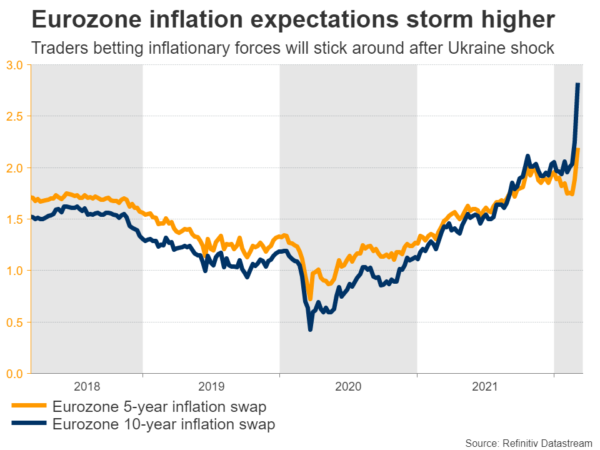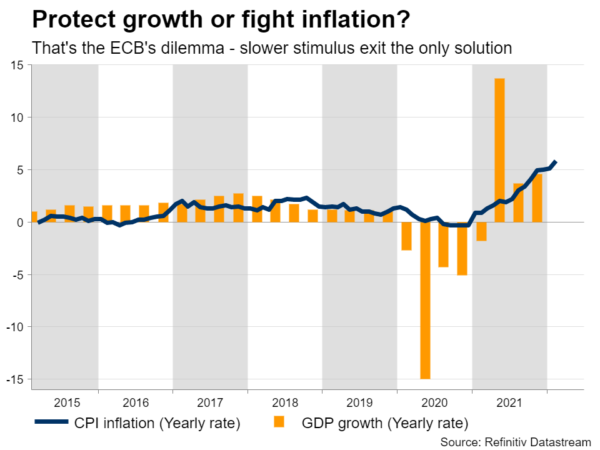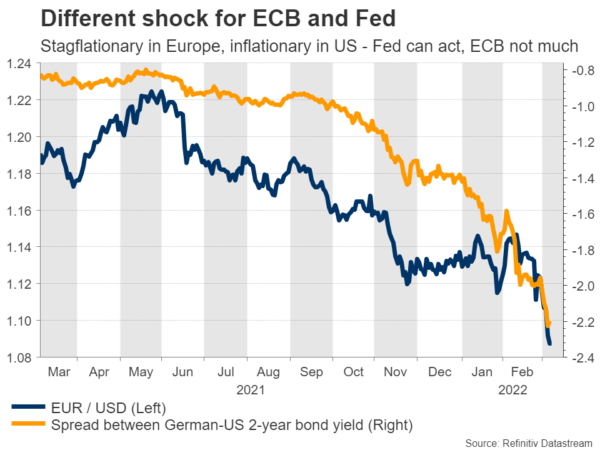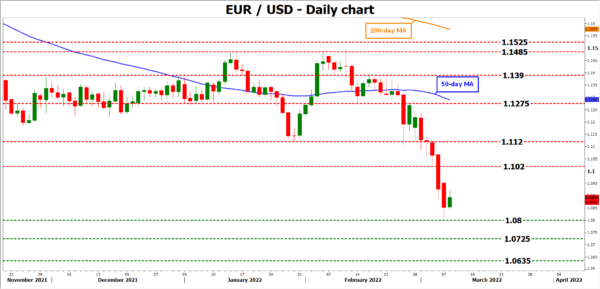The European Central Bank faces a tough dilemma when it concludes its meeting at 11:45 GMT on Thursday. With the crippling sanctions imposed on Russia, European growth will slow down but inflation will heat up as energy prices soar. Will the ECB accept a period of higher inflation and delay its exit from stimulus measures, or forge ahead with higher rates and risk a recession? For the euro, neither choice is attractive.
ECB in a pickle
The crisis in Ukraine has produced another crisis for European monetary policy. Energy and food prices have stormed higher, which will probably propel inflation higher as well. Derivatives traders are already betting that inflationary forces will stick around for longer.
On the other hand, economic growth will take a serious hit. European consumers will get squeezed as a bigger percentage of their income gets spent on necessities. There’s also the banking sector to consider. Several large European banks have high exposure to Russian assets, which have suffered a dramatic devaluation.
Dealing with a situation of slower growth but rising inflation is an impossible task for a central bank. The ECB’s choices are simply terrible. Do you raise interest rates to cool inflation and risk choking economic growth, or do you pause tightening and allow inflation to rage uncontrollably?
Euro braces for impact
For the euro, neither choice is particularly attractive. Delaying the exit from stimulus measures would argue for lower real yields in Europe, while pressing ahead with higher interest rates could be interpreted as a policy mistake since it would raise the risk of a recession.
Traders are saying the ECB will choose option number one. Bets for rate increases have been dialed back since the war erupted, with only one rate hike currently priced in for this year, down from two recently.
For this meeting, the burning question is what happens to asset purchases. Until recently, investors expected the ECB to announce that its QE program would end completely by the summer, opening the door for raising interest rates in the fall. But now, this process could be delayed since moving forward with tightening could backfire.
The updated economic forecasts will also attract attention, as they are expected to reflect the fallout from the conflict in Ukraine.
Euro hostage to politics
The catch is that the ECB wants a stronger euro. A stronger currency would help to cool inflation faster, without the need to tighten policy so much. Hence, ECB policymakers have an incentive to strike a more hawkish tone at the upcoming meetings.
But they might not be able to get their wish. Admittedly, there isn’t much the ECB can do to really change the euro’s fortunes here. Even an announcement that asset purchases will end in the summer – which is probably the most euro-friendly outcome – might not be enough to turn the tide for long.
Everything revolves around geopolitics for now. What the ECB says is secondary. As such, market participants might need to see a ceasefire in Ukraine before the euro can enjoy a proper relief rally.
In the big picture, this crisis will likely leave scars on euro/dollar, because it has very different implications for the two economies. For the Eurozone, this is a stagflationary shock. It implies both slower growth and higher inflation, which leaves the ECB unable to tighten policy properly.
For the US, this is only an inflationary shock. America is energy independent and its banks have almost no exposure to Russian money, so this won’t be a serious setback for the economy. It will just push inflation higher. That’s something the Fed can respond to, and it will.
As a result, euro/dollar has resumed its downtrend and if the bears stay in control, their next target might be the 1.0800 zone.
On the upside, if there is a ceasefire in Ukraine soon or the ECB ends its asset purchases, the pair could edge higher towards the 1.1020 region.




